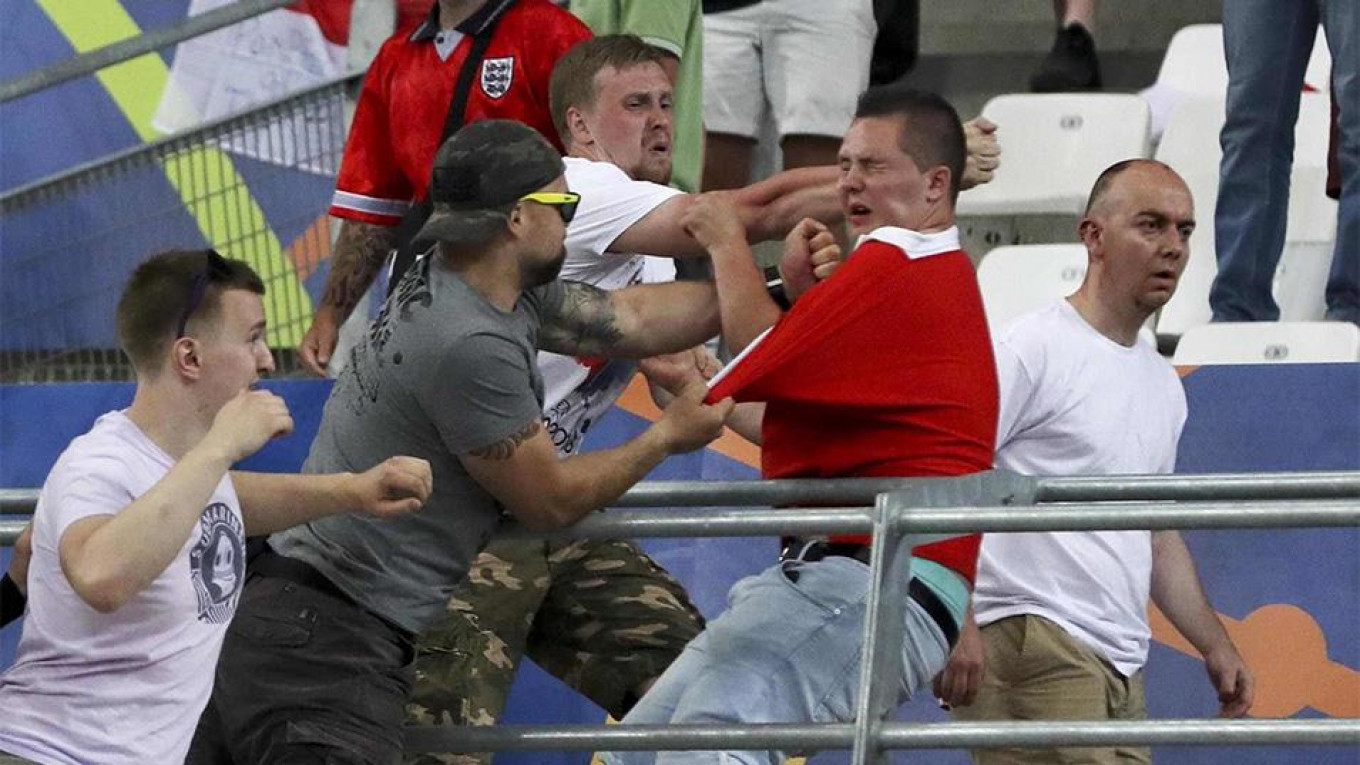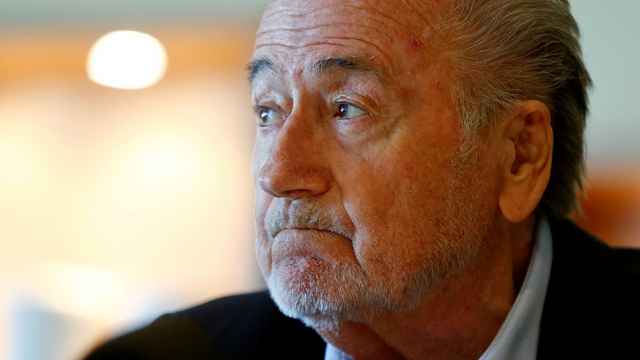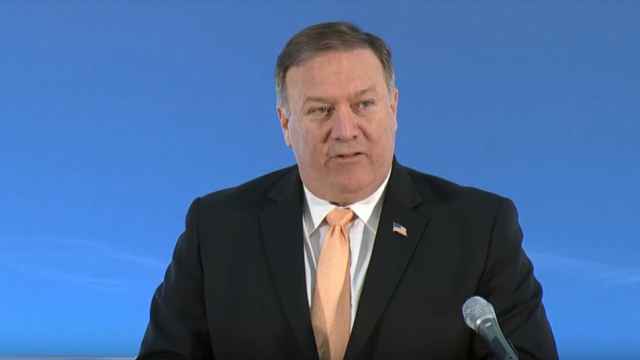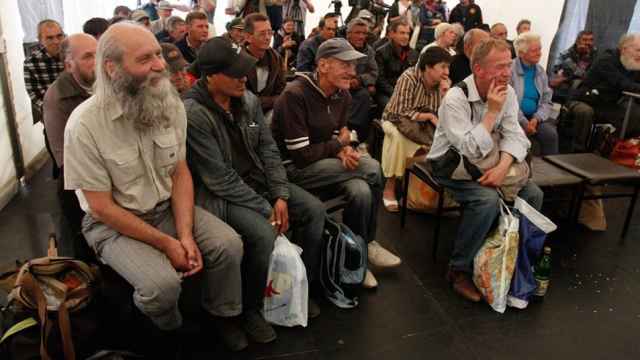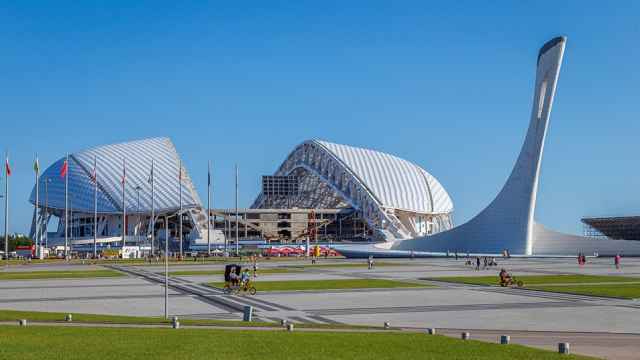Ever since Russian football hooligans crashed their way into the global consciousness with their display of unashamedly gleeful violence at Euro 2016, I have received regular requests from media outlets eager to meet "ultras" thirsting to sup the lager-rich blood of Englishmen at this year’s World Cup.
It is more than a little tiresome. Not to mention pointless. Unless, of course, you happen to be a group of Russian football hooligans, in which case you can now, thanks to the age-old law of supply and demand, command fees of around $3,500 for a brief explanatory chat to a U.S. television crew on the finer points of sticking the boot in.
The media frenzy was understandable in the aftermath of the spectacular violence in France. Masked Russian ultras threatening "war" at the 2018 World Cup sell papers and attract viewers.
But, with the tournament less than six months away, the chances of large-scale football-related clashes at this summer’s event are about as low as the likelihood of Russia’s national team lifting the trophy. That is to say, not too high.
While some Russian government officials made no secret about the vicarious thrills they got from seeing their on-tour hools mashing up Marseille, it is a very different thing to have the very same ultras stomping on heads in Moscow in front of the world’s television cameras.
Vladimir Putin has exceedingly dubious keepie-uppie skills and he is no football fan. But the World Cup is a(nother) vanity project for Russia’s long-lasting leader — one that is designed to showcase Russia to the rest of the planet. Football hooligans are definitely not part of the plan.
Accordingly, well-known Russian ultras have been under police surveillance for some time. Civil rights are not a priority for Russian cops: such is the pressure that some well-known football hooligans are even planning to leave the country for the duration of the World Cup. Their passport exit stamps will act as cast-iron alibis in the unlikely event of trouble. Turkey, I hear, is a popular destination.
“I’m absolutely certain that nothing even close to what took place in Marseille will happen here,” Alexander Shprygin, the man named by British media as the ringleader of Russia’s hools at Euro2016, told me. “There is total surveillance. Even I feel the pressure, and I am an official with a public organization.”
Just days after our chat, Shprygin’s supporters’ association was outlawed, and he was nabbed by masked police while taking a toilet break at a conference at a posh Moscow hotel.
He was questioned over a brawl between rival fans in Moscow before being released. Just for good measure, however, someone set fire to his expensive car that very same evening. The message was clear: No one, and especially not the ultras, will be allowed to get in the way of Putin’s vision for the World Cup.
Three English club sides — Tottenham Hotspur, Liverpool, and Manchester United — have visited Russia since Euro 2016. The sound of peace was deafening. In Rostov-on-Don, Manchester United fans were given blankets to keep them warm during their Europa League tie and the English side’s official Twitter account thanked Rostov FC for the “warm welcome.”
No one is ruling out the possibility of violence altogether, of course. But some believe it is more likely to come from “patriotic” Russians looking to teach evil Westerners a punitive lesson than ultras bouncing off on the skulls of rival fans.
“What are the chances that some pissed off local in the provinces who has been fed a diet of anti-Western television for the last few years will just take an axe and say, ‘I’ll show those bastards? ’Quite high, I’d wager,” Alisher Aminov, a former candidate for leadership of the RFU, Russian football’s governing body, told me last year.
And, if that wasn’t enough to distract from the actual games, there is also the call for a boycott of the World Cup over the Kremlin’s actions in Ukraine.
I am not too convinced by this appeal, which is led by Western critics and Russian human rights figures. Mainly because I have never believed that the World Cup should only be staged in countries with crystal clear records.
That is partly because the first World Cup I remember took place in Argentina, which was ruled at the time by a military junta whose chosen method of combating critics was to throw them out of planes over the Atlantic Ocean.
But also because it is called the “World” Cup — whoever said the world was a good place? I don’t look to FIFA’s quadrennial event for moral guidance. Juntas, dictatorships, and unbridled corporate greed fit right in.
Marc Bennetts is the author of “Football Dynamo: Modern Russia and the People’s Game.” The views and opinions expressed in opinion pieces do not necessarily reflect the position of The Moscow Times.
This article first appeared in our special “Russia in 2018” print edition. For more in the series, click here.
A Message from The Moscow Times:
Dear readers,
We are facing unprecedented challenges. Russia's Prosecutor General's Office has designated The Moscow Times as an "undesirable" organization, criminalizing our work and putting our staff at risk of prosecution. This follows our earlier unjust labeling as a "foreign agent."
These actions are direct attempts to silence independent journalism in Russia. The authorities claim our work "discredits the decisions of the Russian leadership." We see things differently: we strive to provide accurate, unbiased reporting on Russia.
We, the journalists of The Moscow Times, refuse to be silenced. But to continue our work, we need your help.
Your support, no matter how small, makes a world of difference. If you can, please support us monthly starting from just $2. It's quick to set up, and every contribution makes a significant impact.
By supporting The Moscow Times, you're defending open, independent journalism in the face of repression. Thank you for standing with us.
Remind me later.



